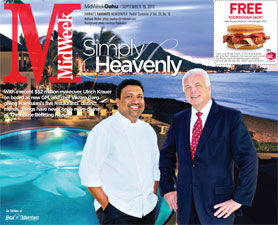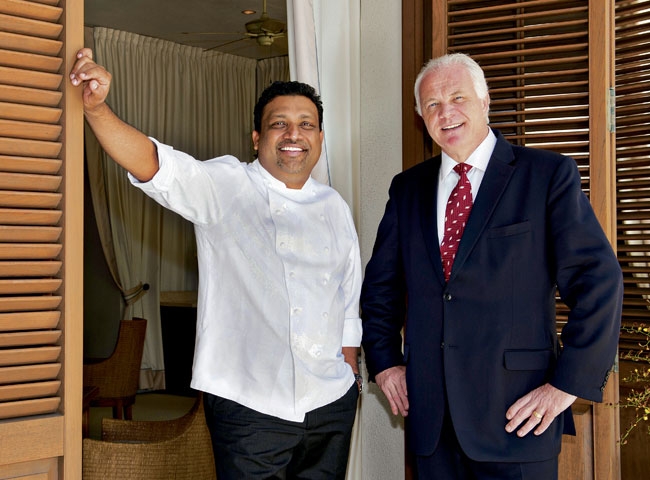Simply Heavenly at the Halekulani
Things have never been more divine at the House Befitting Heaven after a $52 million renovation.
Mana. It’s a rare, soulful quality possessed by very few places in Hawaii. You can’t buy it, have it bestowed or feel entitled to it. It emanates from natural spiritual energy. Yet it is a powerful force that connects people to a place in an indelible way.
Halekulani on Waikiki Beach is said to possess this special quality. It is particularly so at sunset on the beachside lawn, where Hawaiian music, hula and a timeless tradition of aloha are experienced. Generations of visitors and residents have felt this magic that is a legacy by which Halekulani has gained worldwide prominence.
We wanted to explore this ethereal concept with the hotel management and see how it ties in to the resort’s recent renewal program. Can the heritage of the past assure a business its place and prosperity for the future?
We meet newly appointed Halekulani general manager Ulrich Krauer in the executive office overlooking the poolside lawn. He pulls apart white louvers to let in the sunlight and angles himself to point out the ocean view.
“We even have an ocean view,” he smiles.
mw-cover-091912-1
“That would be a partial ocean view,” we correct him. “At many hotels, that gets a premium room rate.”
But why quibble over price? At the Halekulani, all the rooms get a premium rate, ranging from garden courtyard views at $465 a night to premier suites at $7,000 a night. With an inventory of 453 rooms and an average guest stay of five to seven nights, well, you do the math.
Over its 95-year history, this legendary beachfront property has hosted sun-seekers and luxury world travelers. Starting in 1917 as a small residential hotel of five bungalows called the Hau Tree, it has evolved into a top-ranked, world-class resort of five buildings on five acres of prime real estate. In 1984, bungalows gave way to an open-air architectural marvel that is the modern Halekulani (House Befitting Heaven) of today.
Halekulani is renowned for its leadership and groundbreaking innovations that have become standards in the luxury hospitality industry. Since 1984, the hotel has received more than 500 accolades, awards and honoraria, and is consistently ranked among the world’s finest hotels. Halekulani’s fine dining restaurant, La Mer, is Hawaii’s longest- ranked AAA-Five Diamond restaurant.
Gratifying as all that glory is, Krauer, an experienced hotelier and asset manager, admits to its subjectivity.
“There are many different opinions on what five-star is,” he says with his Swiss accent. “We don’t concentrate on what we want to call it. We just do it. People are what make a place special. My job is to take care of two groups of people – external (guests) and internal (employees). There are those who enjoy being waited on and those who enjoy waiting on people. “Our standards are based on four pillars: legacy, culture, quality and service,” Krauer recites. “These principles never change, and even while our physical plant might go through changes and refinement, the basics of our guest-oriented service culture never change.”
Although only weeks on the job – he started Aug. 27 – Krauer speaks from broad experience. He has led several of the world’s most iconic hotels during his 43-year career. He also has been a frequent guest at Halekulani since 1990.
Krauer, 59, most recently served as asset manager to Somerset Grace Bay in the Caribbean and, previously, as general manager of Kona Village Resort on the Big Island. His hotel resume is a marquee of international management experience in California, Texas, French West Indies, Beverly Hills, Miami, France, Scotland and his native Switzerland. Fortunately, language was never a problem. Krauer speaks English, German, Italian, French and Spanish. He is an aficionado of Hawaiian culture, culinary arts and wine, and enjoys outdoor sports such as hiking, tennis and skiing (did we mention he’s Swiss?).
We reflect on the contrast of Kona Village, a resort known for its lack of amenities – no phones, alarm clocks, TVs or air conditioning – to the opulent Halekulani where guests are flushed with every creature comfort and uber luxury goodies.
That brings us to Halekulani’s recently completed renewal program.
A comprehensive physical and service renewal is being unveiled this summer and fall. New guest experiences, services, amenities and epicurean programs are being introduced.
“The renewal of Halekulani provides a unique opportunity for us to re-examine the iconic values that have built its legacy,” says Peter Shaindlin, chief operating officer of Halekulani Corporation.
In a Leaders magazine interview, Shaindlin explains, “In the 1980s and 1990s, luxury hospitality became homogenized because it became institutionalized. Now there is such a commercial homogenization of most products and goods in America that a certain percentage of travelers are looking for independent experiences. So we’re moving into an era where the independent legacy properties like ours have an opportunity to shine.”
And shine it does, to the tune of $52.5 million spent in extensive refurbishment of guest rooms and back-of-the-house infrastructure.
Each of the 453 rooms and suites are refreshed to capture the natural light and airy visual expanses on to the sea. All guest rooms are outfitted with new furnishings, sophisticated lighting, enhanced in-room technology, refreshed soft goods and bathroom fixtures.
“Our business is based on a collection of a thousand details,” says Krauer, as he recalls a time when hotels hid unsightly electrical outlets. “Today you need to have them prominently displayed on the desk for computers and recharging cell phones.”
Not to be outdone by the rooms division, Executive Chef Vikram Garg brings exciting changes to the award-winning La Mer, Orchids, House Without a Key, The Veranda and Lewers Lounge.
L’Aperitif makes its debut at La Mer, a bar inspired by the French cocktail culture of the latter 19th century.
Chef Garg incorporates his culinary training in classical French, Mediterranean and Southeast Asian cooking into his own technique of “infusion” with Indian flavors. Garg prepares everything from scratch, using natural and organic ingredients as often as possible. The Indian spice rubs and mixes he uses are made in-house of spices from India in their raw form.
“To me it’s all fine dining,” says Chef Garg about Halekulani’s dining options. “Whether it’s the casual setting of House Without a Key or the formality of La Mer, we start with the same quality ingredients but apply a different form of preparation and presentation.”
This month is a good time to dine at Halekulani, as it features special dinner menus in connection with the Hawaii Food and Wine Festival.
House Without a Key has an Asian-influenced menu, while Orchid’s offering is Mediterranean, and La Mer is French-inspired. Three-course dinners cost $45 to $120, plus wine pairings from $40 to $60.
What Halekulani offers in food and beverage is important for the kamaaina market that experiences the hotel differently from its carriage trade of westbound (40 percent) and eastbound (60 percent) visitors. Local patronage is centered on restaurants, special occasions including weddings and banquets.
The hotel has years of experience catering to the local diner and its flavor profiles. It also retains islander favorites such as its famed coconut cake, popovers and poha berry jam.
When he first arrived in Hawaii four years ago, Chef Garg went through a tasty learning curve. He dined at places patronized by locals, including Side Street Inn, Alan Wong’s and Hiroshi.
“I love to eat,” exclaims the personable executive chef. “Although I grew up in India and was raised by a vegetarian family, I was the little devil when it came to food. I had a passion for eating that turned into cooking as a career.”
Garg honed his culinary skills at India’s top five-star hotels and restaurants. In 2006, he was invited to be a guest chef at La Mer and enjoyed a week’s stay on Oahu with his wife and two daughters. His youngest daughter sealed the deal to return to paradise by declaring, “Papa, I love it here.”
Was it Halekulani’s “mana” at work?
Perhaps. It calls to all ages and to people from all walks of life who are captivated by the legacy of classic Hawaii and being pampered in paradise.







